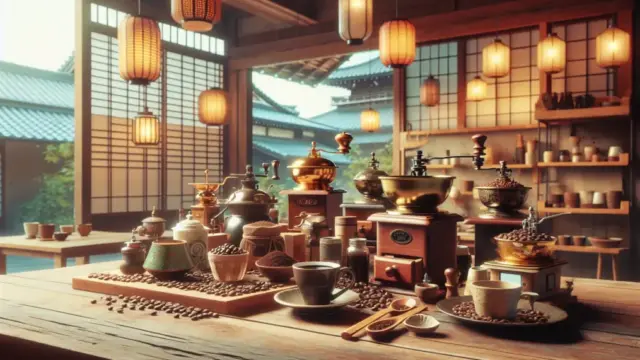Indonesian coffee captivates coffee lovers around the globe with its rich flavors and diverse varieties. In this article, we’ll delve into the allure of Indonesian coffee, exploring its history and showcasing some of its standout types. Are you ready to step into the fascinating world of Indonesian coffee?
We’ll cover a wide range of topics, from different coffee types and cultivation regions to various ways to enjoy this delightful beverage, ensuring even beginners can follow along with ease. By learning about Indonesian coffee, you’re sure to enhance your coffee experience.
- Explore the history and flavor diversity of Indonesian coffee
- Discover the characteristics of notable Indonesian coffee varieties
- Get tips on how to enjoy Indonesian coffee and suggestions for pairings
The Allure of Indonesian Coffee
Indonesia is one of the world’s leading coffee-producing countries, known for its rich soil and diverse climate that nurture truly exceptional coffee. Indonesian coffee stands out from others due to its diverse flavor profile, unique production methods, and rich historical background. Let’s take a closer look at the history and flavor characteristics of Indonesian coffee.
The History of Indonesian Coffee
Coffee was introduced to Indonesia in the 17th century by the Dutch. Initially, there were attempts to cultivate it, which eventually led to commercial production. Particularly on the islands of Sulawesi and Java, coffee plantations began to flourish. Thanks to unique cultivation methods and region-specific varieties, Indonesian coffee developed distinct flavors that continue to captivate coffee lovers today. This rich history plays a significant role in shaping the allure of Indonesian coffee.
Throughout its long history, Indonesian coffee has undergone many transformations, yet it remains deeply rooted in a rich culture and tradition. These elements contribute to the special nature of Indonesian coffee.
- Coffee cultivation in Indonesia dates back to the 17th century
- Major cultivation regions include Sulawesi and Java
- Culture and tradition significantly influence flavor
Flavor Diversity
One of the greatest attractions of Indonesian coffee is its remarkable flavor diversity. Both Arabica and Robusta beans are cultivated, each offering distinctive taste experiences. Arabica beans are known for their fruity notes and acidity, accompanied by a sweet aroma, while Robusta beans are characterized by their deep richness and bitterness.
Moreover, the unique humidity and soil conditions in Indonesia lend coffee a captivating profile with hints of chocolate and spices. This flavor diversity is one of the key factors that elevate Indonesian coffee to a remarkable level.

If you found this article interesting, you might also enjoy “The Depth and Character of Indonesian Coffee—Flavor Differences by Region”. It delves deeper into the flavor differences of coffee from various regions in Indonesia, so be sure to check it out!
- Both Arabica and Robusta beans are cultivated
- Arabica is fruity with acidity, while Robusta has deep richness and bitterness
- Regional humidity and soil significantly influence flavor
A Guide to Indonesian Coffee Varieties
Indonesia is home to two primary types of coffee: Arabica and Robusta. Each variety boasts unique characteristics and flavors that can significantly enhance your coffee experience. In this section, we’ll delve into the differences between Arabica and Robusta, as well as highlight some key Indonesian varieties. Understanding these distinctions will help you make more informed and enjoyable coffee choices.
The Difference Between Arabica and Robusta
Arabica and Robusta are the two most common coffee varieties in the world. Arabica is generally regarded as the higher quality option, featuring a fruity acidity and sweet aroma. Indonesian Arabica, in particular, is known for its rich flavor profile that captivates coffee enthusiasts. On the other hand, Robusta is characterized by its strong bitterness and contains about twice the caffeine of Arabica. This makes for a bolder and more intense flavor experience.
By grasping these differences, you can select a coffee that suits your personal taste. If you prefer Arabica, you’ll enjoy its elegant flavors, while those who opt for Robusta can savor the robust qualities of a more intense brew.
- Arabica is known for its fruity and sweet aroma
- Robusta has a stronger bitterness and higher caffeine content
- Helpful in choosing coffee that matches your preferences
Characteristics of Major Varieties
In addition to Arabica and Robusta, several other notable coffee varieties are cultivated in Indonesia. For instance, Java coffee is particularly popular among Arabica varieties, distinguished by its deep body and spicy flavor profile. Meanwhile, Bali coffee is celebrated for its creamy texture and pronounced sweetness, making it an easy-drinking option.
Furthermore, Sulawesi Island is home to a unique variety known as Toraja coffee. This coffee is recognized for its distinctive flavor and aroma, with a perfect balance of sweetness and acidity. As you can see, Indonesian coffee offers diverse characteristics based on the region, providing a multitude of ways to enjoy your coffee.
- Java coffee features a deep body and spicy flavor
- Bali coffee is creamy and notably sweet
- Toraja coffee boasts a perfect balance of sweetness and acidity
Coffee Growing Regions in Indonesia
Indonesia is home to several regions that are ideal for coffee cultivation. Among these, Sulawesi and Bali stand out, each offering unique flavors and specialties. In this section, we’ll dive deeper into the coffee from Sulawesi and the local products of Bali. The coffees from these areas are a reflection of Indonesia’s rich culture and natural environment.
Coffee from Sulawesi
Sulawesi is particularly famous for its Toraja coffee. This region boasts high altitudes and a climate with just the right humidity, making it perfect for coffee cultivation. Toraja coffee is beloved by many coffee enthusiasts for its rich aroma, sweetness, and a perfect balance of acidity.
Moreover, many farmers in Sulawesi use traditional methods to cultivate and process their coffee, resulting in carefully produced beans. This attention to detail ensures that the coffee is of high quality and possesses unique flavors. Enjoying Sulawesi coffee offers a special experience that transports you to its lush landscapes.
- Sulawesi is renowned for Toraja coffee
- Rich aroma with a perfect balance of sweetness and acidity
- High-quality coffee produced using traditional methods
Local Products of Bali
Bali is well-known for its coffee, particularly Bali coffee. Characterized by its creamy texture and strong sweetness, Bali coffee has a smooth flavor that makes it very approachable. It’s especially recommended for those new to coffee, as it is easier to drink compared to other varieties.
In addition, Bali embraces organic farming practices, promoting environmentally friendly production methods for its coffee. This results in flavorful beans that are popular with health-conscious consumers. Sipping on Bali coffee can provide a moment of relaxation and enjoyment amid the island’s serene beauty.
- Bali coffee is creamy and sweet
- Easy to drink, making it a great choice for coffee beginners
- Environmentally friendly production through organic farming practices
Enjoying Indonesian Coffee
Indonesian coffee offers a rich variety of flavors and brewing methods, making it a delightful experience for coffee lovers. By exploring different extraction techniques and food pairings, you can elevate your coffee time to new heights. In this section, we’ll delve into the various brewing methods for Indonesian coffee and suggest some food pairings that complement its unique taste. Get ready to discover your perfect way to enjoy this exceptional brew!
Brewing Methods
There are numerous ways to brew Indonesian coffee, each offering a distinct experience. You can choose from methods like French press, drip, or espresso based on your personal preference. With a French press, you’ll enjoy a rich and robust flavor as the coffee oils are fully extracted. On the other hand, brewing with a drip method gives you a clean taste, allowing the coffee’s nuanced flavors to shine through.
Espresso is another fantastic option, providing a concentrated flavor that pairs beautifully with milk or cream. Experimenting with these different brewing techniques allows you to appreciate the diverse profiles of the same Indonesian coffee, showcasing one of its most appealing features.
- French press for a rich flavor
- Drip brewing for a clear taste
- Espresso offers a concentrated flavor that’s perfect with milk
Perfect Food Pairings
Indonesian coffee can be further enhanced by pairing it with a variety of foods. For instance, the creamy notes of Bali coffee pair wonderfully with chocolate cake or cookies. These sweet treats complement the coffee’s flavor, enhancing its overall profile.
Similarly, the rich aroma of Toraja coffee goes well with nuts and fruits. The nuttiness and the tartness of fruits create a delightful balance, elevating the coffee’s taste to a new level. When savoring Indonesian coffee, don’t miss the opportunity to enjoy it alongside some delicious food combinations.
- Bali coffee pairs well with chocolate cake or cookies
- Toraja coffee is fantastic with nuts and fruits
- Enjoying food pairings enhances the coffee’s flavors
Summary
Indonesian coffee continues to captivate enthusiasts with its rich history, regional characteristics, and the diverse flavors that arise from its various types. From renowned varieties like Arabica and Robusta to the unique coffees cultivated in regions such as Sulawesi and Bali, each has its own distinct personality, offering a plethora of ways to enjoy them. By experimenting with different brewing methods and pairing ideas, you can further enhance the allure of Indonesian coffee.
Through this article, we hope you’ve discovered the charms of Indonesian coffee and are inspired to find your perfect cup. Savoring a good coffee can bring delightful moments to your everyday life.
- Indonesian coffee offers a wide variety of flavors to explore.
- It’s essential to understand the unique traits of both Arabica and Robusta.
- Experimenting with brewing methods and pairings can broaden your coffee enjoyment.
So why not get your hands on some Indonesian coffee and experience its magic for yourself? We’d love to hear your thoughts and favorite brews in the comments section!









































Comment